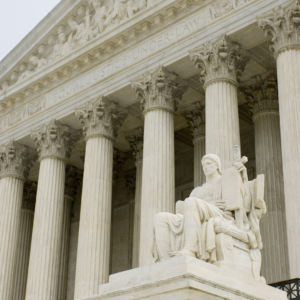President Donald Trump has wasted no time in making his presence felt in Washington. In just his first week, Trump has signed numerous executive orders reversing Obama-era policies, including one signaling the new president’s resolve to reverse course on the Affordable Care Act and a series of orders expediting energy-related projects and bringing the Keystone XL and Dakota Access pipelines back to life.
The most important announcement of Trump’s first week in office, however, may very well be that he soon plans to name his selection to fill Justice Antonin Scalia’s still-vacant Supreme Court seat. According to reports by The New York Times and Politico, among other outlets, Trump has narrowed his search to two or three, with the Times reporting 11th Circuit Court of Appeals Judge William Pryor and 10th Circuit Judge Neil Gorsuch the most likely to be chosen. Based on what we know about the two jurists, who is Trump likely to pick?
Pryor and Gorsuch have a long history of supporting pro-liberty causes and hold originalist views on interpreting the Constitution, the view held by the late Justice Scalia. In either case, most of those who supported Scalia, including many in the “Never Trump” wing of the Republican Party, will be quite pleased with the result.
However, Trump’s decision could have a far-reaching impact on his presidency, potentially dogging his agenda for years to come. For instance, Pryor an otherwise staunch social conservative who once referred to Roe v. Wade as one of the “worst examples of judicial activism” in American history, joined the majority in a controversial 2011 case that held “a government agent violates the Equal Protection Clause’s prohibition of sex-based discrimination when he or she fires a transgender or transsexual employee because of his or her gender non-conformity.”
Pryor’s view on transgender rights has made him a target among some social conservatives who say such an opinion could lead to future decisions by the Supreme Court that imposes transgender rights on private institutions, including religious establishments, and that it’s a sign Pryor might engage in judicial activism.
It’s also unclear how many in the evangelical Christian community, a group that overwhelmingly supported Trump in the 2016 election, might feel about Pryor’s support for some transgender protections. According to the Pew Research Center, 81 percent of evangelical voters supported Trump, compared to just 16 percent for Hillary Clinton, a larger margin of victory than that enjoyed by George W. Bush in 2004, John McCain in 2008, or Mitt Romney in 2012.
Support from evangelicals is going to be essential to Trump’s run in 2020, so doing anything that might damage their opinion of him so early in his presidency could prove to be disastrous.
Pryor also, perhaps ironically, may end up being the more controversial of the two judges with liberals concerned about gay rights. In a 2003 supporting brief about a Texas law criminalizing sexual relations between two people of the same sex, Pryor wrote, “The states should not be required to accept, as a matter of constitutional doctrine, that homosexual activity is harmless and does not expose both the individual and the public to deleterious spiritual and physical consequences.”
At 49, Gorsuch is five years younger than Pryor and isn’t without controversies of his own. A graduate of Columbia, Harvard and Oxford, Gorsuch is an avid believer in restricting the power of regulatory agencies, a decision many environmental organizations would find particularly concerning. On that front, Gorsuch may be more conservative than Scalia.
For instance, Gorsuch opposes what’s known in administrative law as “Chevron deference,” a legal principle giving power to government agencies when a law is considered ambiguous. Although Scalia often opposed agencies imposing expansive regulations on individuals and businesses, he was a big defender of Chevron, one of the few issues on which many limited-government advocates disagreed with Scalia.
Despite the serious opposition Gorsuch will likely receive from environmental groups and Democrats who want to expand regulatory power, he seems to be the safer of the two choices for Trump, and therefore the most likely pick. Gorsuch’s commitment to taking power out of the hands of federal agencies fits well with Trump’s commitment to expanding domestic energy development and making the United States a friendlier place for businesses, both large and small, to operate.

